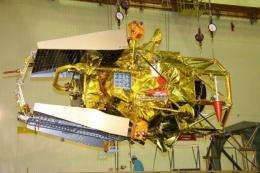The Phobos-Grunt probe at Russia's Baikonur cosmodrome on October 18. Russia's space agency said Tuesday there was little chance of saving its Phobos-Grunt probe that aimed to bring back soil from Mars' largest moon but has been stranded in Earth orbit since its launch.
Russia's space agency admitted Tuesday there was little chance of saving a probe that aimed to bring back soil from Mars's largest moon but has been stranded in Earth orbit since launch.
"There is little chance that we will be able to realise this mission," the deputy head of Roscosmos Vitaly Davydov said in the first official acknowledgement that the probe is likely lost.
Russia launched the Phobos-Grunt research probe to the Martian moon Phobos on November 9, in an attempt to reinvigorate its interplanetary programme which had not seen a successful mission since the fall of the Soviet Union.
However hours later the probe failed to depart the Earth's orbit and mission control lost radio contact with the craft.
"We need to be realists. Since we could not establish contact for so long, the chances to carry out this expedition right now are very slim," Davydov said, quoted by the ITAR-TASS and Interfax news agencies.
Roscosmos still does not know what exactly went wrong with its ambitious five-billion-ruble ($165 million) probe, which was meant to scoop up soil on Phobos and bring it back to Earth by 2014.
"If we gain contact and understand what is happening with the probe, then maybe we will be able to draw conclusions. But now we have no information from the craft," Davydov said.
"There is no telemetry, we simply don't understand what is happening," Davydov said, referring to information about the probe's position in space.
Russia's space officials admitted from the beginning that the mission was a big risk as due to its complete lack of experience in the last two decades in successfully sending probes to the solar system.
However the launch was carried out to take advantage of the current position of the planet which means the distance between Earth and Mars is relatively short. The next such "window" will open up in two years, Davydov said.
The 13.5 tonne probe, out of control and carrying highly toxic fuel, could also crash into the earth, Roscosmos has warned. However Davydov said it is impossible to predict the exact position of such an event.
"The crash area of any craft can only be estimated in the final 24 hours," he said. "Before then, saying what will fall and where is pointless.
Russia suffered several space failures over the past 12 months after three navigation satellites plunged into the ocean in December, followed by loss of satellites for military and digital television.
In August, a cargo ship bound for the International Space Station crashed in Siberia, leading to fears that ISS crew may have to be evacuated.
The space agency's long term plans now be clear once the probe is established a failure, and insurance payments are made out, Davydov said. It was insured for 1.2 billion roubles ($40 million).
Davydov said that Russia may be better off in future sending probes to the Earth's moon and researching Mars in cooperation with its international partners.
"Maybe it makes sense to switch to more comprehensive steps towards the Moon, and regarding Mars, to rely on cooperation with our foreign partners," Davydov said.
(c) 2011 AFP























